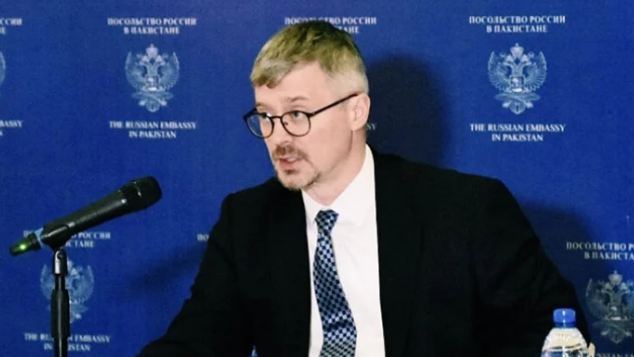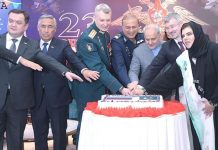MOSCOW, NOV 19: Russia on Wednesday offered its help in mediating Pakistan’s conflicts with India and Afghanistan, amid ongoing tensions between the neighbouring countries.
Islamabad’s relations with India have remained tense since the four-day war in May, while the Afghan Taliban regime also drew Pakistan into a brief skirmish last month.Speaking during a discussion organised by the Institute of Strategic Studies Islamabad, Russia’s Ambassador to Islamabad, Albert Khorev, said that his country stood ready to mediate the conflicts between Pakistan and India, as well as between Pakistan and Afghanistan.
“We also share mutual concern about regional security, especially the situation in Afghanistan, and support continued cooperation to ensure peace, counter terrorism and contribute to social and economic development,” he added.
Ambassador Khorev maintained that Russia views Pakistan as an important regional partner, saying that the country held significance in Russian President Vladimir Putin’s initiative to establish the Greater Eurasian Partnership.
He said that the initiative proposed that “regional problems should be solved by regional actors”.
The Russian envoy was of the view that tensions in relations between South Asian countries were “often provoked by external states”.
Islamabad has repeatedly expressed gratitude to friendly countries for making efforts to mediate tensions with Afghanistan.
Earlier this month, the Foreign Office said that Pakistan welcomed any efforts aimed at mediating tensions between bordering nations.
“We welcome Iran’s efforts at mediation. We are confident that they can play an important role in mediation,” the FO spokesperson said after Iran extended the offer for the same.
Islamabad has also expressed regret over the breakdown of the peace negotiations, mediated by Qatar and Turkiye, with the Afghan Taliban after the two nations engaged in week-long border clashes last month.
Pakistan-Afghanistan border clashes
The clashes began after the Taliban forces, backed by their affiliated militants, launched an unprovoked attack on the border posts of the Pakistani forces on October 12.
Pakistan’s retaliatory strikes resulted in the killing of more than 200 Afghan Taliban and affiliated militants, while the Pakistan Armed Forces also conducted “precision strikes” deep inside Afghanistan, including Kabul and Kandahar province.
However, as many as 23 Pakistani soldiers also embraced martyrdom while defending the homeland.
Pakistan has accused elements within the Afghan Taliban regime of acting at the behest of New Delhi to destabilise the country.
In an interview last month, Defence Minister Khawaja Asif said that “India started a proxy war against Pakistan using Kabul” to compensate for the defeat it faced during the May conflict.
The defence minister said that the Taliban delegation — engaged in negotiations with Pakistan — “was powerless”, saying that real power rested in Kabul, which was penetrated by India.
Pakistan-India conflict in May
The four-day war between the two nuclear-armed neighbours broke out in May after India conducted missile strikes inside Pakistan, hitting civilian infrastructure.
The strikes, which New Delhi claimed were aimed at “terrorist targets” in response to the Pahalgam attack, resulted in the martyrdom of several civilians and security personnel.
Pakistan, in its response, downed multiple Indian fighter jets, including French-made Rafales.
Security forces also launched a large-scale retaliatory strike, named “Operation Bunyan-um-Marsoos”, targeting over 20 Indian military sites across multiple regions.
In addition to downing Indian fighter jets, Pakistan’s JF-17 Thunder jets also destroyed India’s S-400 air defence system in Adampur via hypersonic missiles.
The clashes, in which both countries struck targets deeper into each other’s territories than at any point in the past 50 years, ended on May 10 after they agreed to a US-brokered ceasefire agreement.

















